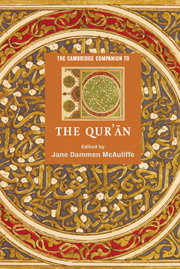Book contents
- Frontmatter
- Introduction
- Part I Formation of the Qur'ānic text
- Part II Description and analysis
- Part III Transmission and dissemination
- Part IV Interpretations and intellectual traditions
- 9 The tasks and traditions of interpretation
- 10 Multiple areas of influence
- 11 Western scholarship and the Qur'ān
- Part V Contemporary readings
- Qur'ān Citation Index
- General Index
11 - Western scholarship and the Qur'ān
from Part IV - Interpretations and intellectual traditions
Published online by Cambridge University Press: 28 March 2007
- Frontmatter
- Introduction
- Part I Formation of the Qur'ānic text
- Part II Description and analysis
- Part III Transmission and dissemination
- Part IV Interpretations and intellectual traditions
- 9 The tasks and traditions of interpretation
- 10 Multiple areas of influence
- 11 Western scholarship and the Qur'ān
- Part V Contemporary readings
- Qur'ān Citation Index
- General Index
Summary
Early in the twentieth century, the notion of what was meant by Western scholarship on the Qur'ān would not have created much discussion. It was quite obvious that the phrase referred to scholarly work on the Qur'ān undertaken by European academics who were not Muslims. Continuing with such an understanding in the twenty-first century is quite problematic, however, both for its suggestion that work by those who declare themselves to be Muslims cannot be included in such a category - this is evidently false as browsing the bookshelf of any scholar today will reveal - and for the vagaries of the term 'scholarly' when it is applied to an intellectual world that is increasingly diverse methodologically and culturally. How are we to distinguish in a meaningful way between the discipline of exegesis (tafsīr) as it might be exercised today by a Muslim living in Europe from that of an academic working in a North American university within the discipline of religious studies? The answer is not necessarily as apparent as both of those individuals may wish to assume.
One might argue that what is intended here by Western scholarship on the Qur'ān is simply that which adopts an approach that involves a nonconfessional ('secular') attitude towards Islam. Such is the shorthand that would often be used in modern discussions.
- Type
- Chapter
- Information
- The Cambridge Companion to the Qur'ān , pp. 235 - 252Publisher: Cambridge University PressPrint publication year: 2006
- 15
- Cited by



